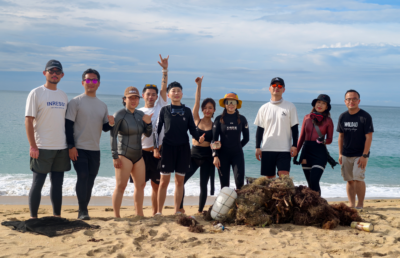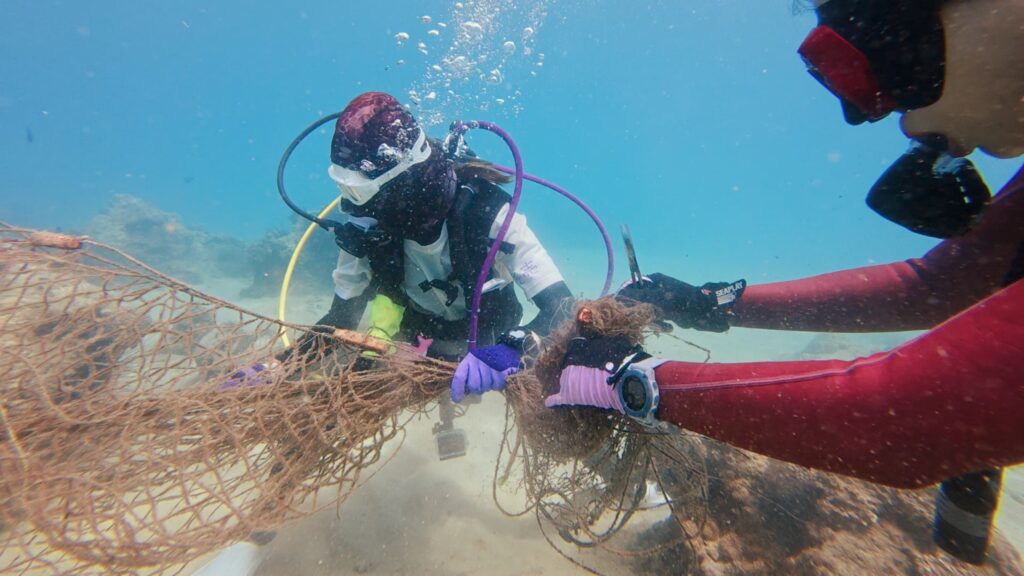
Marine plastic pollution caused by abandoned, lost, or discarded fishing gear — known as ghost gear or ghost nets — is an urgent global challenge. Abandoned fishing gear not only directly threatens marine life but also damages the health of coral reefs, seagrass beds, and other vital marine ecosystems, reducing their resilience to climate change. It impacts the livelihoods and well-being of tens of millions worldwide by causing losses to fisheries and economic development. Systemic solutions are urgently needed, including retrieving existing ghost nets from the ocean, implementing full lifecycle management of fishing gear, strengthening regulations to reduce abandonment and improper disposal, and promoting circular design and recycling of fishing gear.
In honor of World Oceans Day on June 8th, WildAid in partnership with the marine conservation group N.O.C. (Nature Ocean Conservation) and under the guidance of the First Institute of Oceanography of the Ministry of Natural Resources launched the public welfare initiative “No Net Left Behind, Dive in to Help Protect” in Wanning, Hainan Province, China. This effort is part of the broader “No Net Left Behind Partnership Program”, launched in October 2024 to unite environmental groups, NGOs, businesses, research institutions, and media in the search for solutions to ghost gear pollution — including retrieval, recycling, and public education.
The 2025 World Oceans Day celebration brought together partners including MUJI China, Better Blue, the Blue Ribbon Ocean Conservation Society, and Weibo Charity for a series of awareness-raising and action-driven events. Over two days, 13 trained divers conducted four retrieval dives, removing approximately 100 kg of abandoned fishing nets entangled in coral reefs — a small but vital step in restoring marine ecosystems and building momentum for long-term change.
Yu Chong, Chief Representative of WildAid’s Beijing Office, said, “Diving to retrieve ghost nets is currently the most direct solution and a key mission of the ‘No Net Left Behind Partnership Program.’ We documented the entire process to help the public understand the challenges of addressing marine plastic pollution [once it’s already in the ocean]. We hope more partners from diverse fields will join us in building a comprehensive recycling and reuse system to reduce the flow of abandoned fishing gear into the ocean.”


Abandoned fishing gear often entangles corals, breaking them and hindering photosynthesis. Plastic debris also fosters bacteria and other microorganisms that harm coral, further reducing survival rates and destroying marine habitats. “The longest net retrieved in this operation was about 80 meters — if fully stretched, it could cover over 100 square meters of coral reefs, affecting countless marine species that depend on them,” said Shen Jian, founder of N.O.C. and a participating diver. “A successful ghost net cleanup not only removes these ‘phantoms’ threatening marine life but also uses striking visuals and science communication to raise awareness about this invisible ocean killer.”
Better Blue, a new member of the “No Net Left Behind Partnership Program”, pledged to train and empower more divers to specialize in underwater debris cleanup. Through monthly cleanups, diving site adoption network, and hotspot identification for ghost nets, they aim to remove at least 10,000 pieces of ghost fishing gear over the next decade. Data collection and source analysis will further support regional solutions to ghost nets.
Along with supporting the ghost net retrieval, MUJI organized a beach cleanup at Shimao Shimei Bay in Wanning, reinforcing public awareness of ocean conservation from sea to shore, from source reduction to recycling. Kento Horiguchi, General Manager and Chairman of MUJI China, said, “MUJI hopes to drive tangible progress in addressing marine plastics. True sustainability isn’t separate from daily life but integrated into it—from beach cleanups to everyday products, each step builds a more balanced relationship between people and nature.”
Stay in touch and get the latest WildAid updates.
SIGN UP